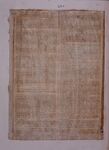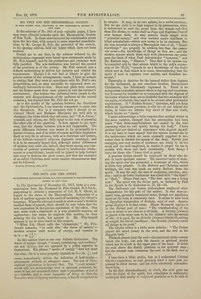Mr. Felt and the Theosophical Society
In the columns of No. 285 of your valuable paper, I have seen some editorial remarks upon the Theosophical Society of New York. In these strictures you lay considerable stress upon the fact that, with respect to some expected manifestations by Mr.-George H. Felt, the president of the society, in his opening address, held out hopes which have not been realised.
Permit me to say that, in the address referred to, the anticipations expressed were based upon statements made by Mr. Felt himself, and by his professions and promises were fully justified. The non-realisation was beyond the control of the president or of the society. Mr. Felt entered into a definite undertaking to deliver his lectures and exhibit his experiments. Though I do not feel at liberty to give the precise nature of the arrangements made, I have no scruple in stating that they were in accordance with Mr. Felt’s own propositions, and, as may naturally be supposed, were exceedingly favourable to him. Time and place were named, and the former more than once altered to suit the lecturer’s convenience. One lecture was delivered twice (much to the surprise and disappointment of the audience on the second occasion), but beyond that Mr. Felt did not go.
As to the merits of the question between the Occultists and the Spiritualists, I am scarcely competent to enter into the discussion. Nor is it necessary that I should do so. Colonel Olcott and Madame Blavatsky are well able to champion the views which they advocate, and “M.A. Oxon.,” yourself, and others, are fully equal to the task of pursuing the other side of the question.' It does appear to me, however, that the chasm between you is not impassable. The great difference between you seems to lie principally in a matter of terms, and of an order of causes and their sequences, Each is very far in advance, both as to doctrines and system, of the hitherto accepted religious dogmatic teachings; and it is to be earnestly hoped that, although minor differences of opinion may exist (as, indeed, they must among any community of persons possessing claims to intellectual attainments or possibilities), hands will be joined to help forward and carry to fruition the good cause, and that the examples of so-called Christian sects under similar circumstances may not be followed.
London, February 15th, 1878.
The Soul and the Spirit
In The Spiritualist of December 27, 1877, there is a communication from Mr. Desmond G. Fitz-Gerald, M.S.Tel.E., purporting to criticise a statement of Col. H. S. Olcott, in regard to the views of the Theosophists. Somewhat of a lack of candour appears in the mode of rendering Col. Olcott’s language. When the attempt is made to state a man’s words in another form of speech, there should be care taken that the new expression be the precise equivalent of the other. One may make such a statement in a very plausible manner, ad captandum; but when he neglects this caution, he does nothing for the truth, but against it. Mr. Fitz-Gerald appears to me to have erred in this respect. “What Col. Olcott calls the 4 elementals,’” Mr. Fitz- Gerald remarks, “he calls also 4 the forces of nature,’— modern science calls modes of energy, and equates to m. h = m. v2/2f.”
In this matter there is one very definite distinction. The mforces of nature though “errant, unthinking, and soulless,” are not lifeless, but are operated by a power superior to themselves. The phrase “modes of energy” does not meet this idea; for it is more properly equated, m. h = m. !/?; and comes immediately within the definition of half-truths—phenomena without an adequate cause. The aim of Theosophical exploration is beyond that. The “exact science” which will not acknowledge God or spiritual existence, because it has not measured either with a plumbline, or put it in a crucible, and is more incapable of doing so than the Danaides were of dipping out the ocean, is hardly competent to be umpire. It may, in its own sphere, be a useful auxiliary. But we can yield it no high respect in its pretensions, when it endeavours to oust the priest from the temple and God from His shrine, to install itself as Pope and Supreme Pontiff over human faith. It may practise black magic with “potential energy,” and even enchain men’s intellects to blind materialism—which now seems to be its outcome. But the true scientist is always a Theosophist first of all. “Exact knowledge” can properly be nothing less than the γνώσις τών οντων—the knowledge of things as they are; and the modern science which deals only with phenomena can never pass the limit of what Paul denominates “temporal,” and the Eastern sage, “Illusion.” That flaw in its system can be remedied only by that science which in the noble expression of Dr. Wyld, “reveals to us a knowledge of the world which now is, that which is to come, demonstrating that the spirit of man is supreme over matter, and therefore immortal.”
Theosophy is doctrine for the learned rather than dogmas for the unlearned, as our excellent brother, Hurrychund Chintamon, has felicitously expressed it. There is no antagonism to modern science where it has any real exactness; but it cannot be founded on or connected with the dogmas of the latter wherein these are so doubtful that two scientists will not agree, or wherein they need to be revised after profounder explorations. If “Modern Science,” therefore, will not keep within its legitimate province, it will be—if not behind the times, at least—an infinite way short of that real truth, which knows no “times.”
I must acknowledge a little surprise that another writer in the same number, charged that the assumption had been made “that form-manifestations are caused by the soul (meaning what we call spirit) leaving the body.” I have neither had nor desired an experience with doppels myself. It is my bent to learn myself and the cosmos around me by the testimonies which are more normally supplied to me, rather than to disturb the manes of the dead. Spirits just emerging into new modes of existence are likely to be too much and too well employed, to render it proper for me to meddle with them and their vicissitudes. Such things I leave for those who “know God in parts.”
A preciser diction should be employed by those who desire to know spiritual science. The incorrect habit of terming the spirit soul has promoted a looseness of idea, which is often very pitiable. In the Hebrew and Christian sacred writings, the soul was made an entity distinct from the spirit. It was the self, the seat of sensation, emotion, passion; and in its lower tendencies was allied with “the heart” or “flesh.” Hence Paul says “The first man was a living soul.” The spirit was the divine part, as declared by Paul in his Epistle to the Galatians iv. 16, 22—25.
The Hellenian and Ionian philosophers employed other designations for this part of our nature. It was denominated nous, generally translated mind, though not signifying mind as the term is commonly used. It seems to have been an Egyptian designation of divinity, nout or noot. Anaxagoras employs it in that sense. Hence Menander applies it to the diviner part of man: “The overshadowing of the nous or mind is our daimon or divinity. A divinity (daemon) is placed with every man to be his initiator into the arcana of life; it is good, for no divinity (daimon) thinks ill, setting at nought the life of excellence; the divinity (daimon) needs all things to be good.”
The Orphic writer is a little more definite: “The Father placed the mind (nous) in the soul, and the soul in the sluggish body.”
Plutarch asserts that the soul—the psychical entity—never leaves the body, but only the daemon or spiritual double which has its abode in the upper part of the head. It holds the soul above the fleshly passions in the spiritual man; but the sensual man immerses the soul in the flesh and so dies.
I have been a little prolix, but as I understand Colonel Olcott’s exposition, he said precisely what I have just expressed in other terms; and the critic absolutely misunderstood him.
In the first disembodiment, at death, the soul goes out with the light of the spirit, but sometimes is sufficiently enveloped with earthy or corporeal particles as to be able to <... continues on page 4-221 >
Editor's notes
Sources
-
London Spiritualist, No. 287, February 22, 1878, p. 89


